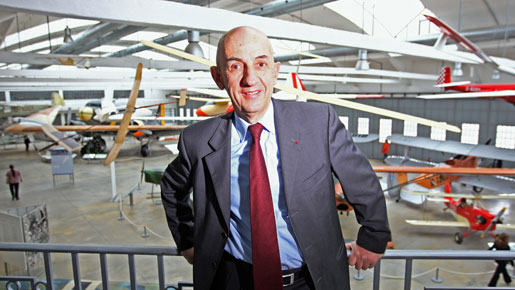
The CEO of The European Aeronautic Defence and Space Company hopes to secure a multi billion pound deal with the Americans. Louis Gallois is a French businessman at the centre of a £23.3bn contract battle between the US and Europe.
He is Chief Executive Officer of The European Aeronautic Defence and Space Company N.V. (EADS) a corporation created in 2000 by the merger of Germany’s DaimlerChrysler Aerospace AG, France’s Aerospatiale-Matra and Spain’s Construcciones Aeroauticas.
In March 2010 Gallois was close to securing a $35bn contract for EADS to build refuelling aircraft for the US air force, guaranteeing thousands of jobs in Britain, France, Germany and Spain. But a review of the deal by the American Government could now see Gallois and his company miss out in the end game. Although he has previously supported laying off workers and reducing costs, he also claims to have maintained a balance throughout his career between diplomacy, saving money and preserving his companies’ skills bases. It is a formula that could deliver the ultimate prize. But he will require even greater skills to maintain EADS’s growth in the face of tough competition from the US market if the deal falters.
Louis Gallois – a married father of three – was born on January 26, 1944, in Montauban, tarn-et-Garrone, south west France. He graduated from the École des Hautes Etudes Commerciales (HEC) in Economic sciences. He also studied at the École Nationale d’Administration (ENA), the country’s elite college for administrators, where he trained to oversee France’s state enterprises. From 1972 his work involved a variety of positions in Government posts, where he learnt as much about politics as business management. He started off in the staff of the French Department of the Treasury.
In 1981 he became Head of the Cabinet Office of the Ministry of Research and Industry, climbing to the position of Director General for Industry in the same ministry one year later. In 1988 he was nominated to the position of Head of the Civil and Military Cabinet office of the French Ministry of Defence. It was not until 1989 that he came to real prominence when he climbed to become head of the Société Nationale d’Étude et de Construction de Moteurs d’Aviation (Snecma), a state-run enterprise responsible for developing and manufacturing civil and military engines for Mirage jet fighters and Airbus airliners.
He was made chairman and CEO of Aérospatiale, the state-subsidised company involved in France’s aerospace and defence industries, in July 1992. Although he was responsible for extensive restructuring and cost cutting, the company continued to lose money. In 1996 he made the shift from air to rail, when was appointed chairman of the French national railway company Société Nationale des Chemins de Fer Français (SNCF). Gallois stated at the time that his goal was to increase business and to make SNCF the best public-service organisation in Europe.
As chairman until 2006, he managed to boost the service’s position significantly, elevating it to France’s main provider of local and long-distance passenger and freight services. Gallois attempted to achieve 11 percent growth in passenger traffic and 15 percent growth in freight between 2000 and 2002. Renovation of the train company’s coaches and more than 1,000 train stations saw a major upgrade of the service, with new railcars, and renewed and increased the company’s locomotive fleets. About 150 trains were brought in to facilitate increased freight traffic over the next decade.
He was responsible too for SNCF’s Eurostar joint venture, offering a unique rail service to passengers between Paris and London via the Channel Tunnel.
Gallois served as President of SNCF, the French railway company before taking up the EADS post in 2007. Prior to that he had been made CEO of Airbus in 2006, with the expectation that he would solve problems relating to profits. As non-executive director of the European aviation company, he knew the details of the business and its management make up and structures.
Along with a commitment to increasing profit potential, he promised to embrace environment friendly operations, targeting a 30 percent reduction in company energy consumption and 50 percent reduction in CO2 emissions by 2020. He also committed to re-invest savings expected from environmental initiatives back into research into cleaner technologies. Although he has a reputation for managing costs and reducing overall spending, it is likely to be his ability, or lack of it, to secure the US deal that will define 2010. There is a great deal at stake, for both Gallois and the company.
EADS is a global leader in aerospace, defence and related services. In 2009, the group – made up of Airbus, Eurocopter, EADS Astrium and EADS Defence Security – generated revenues of €42.8bn and employed a workforce of more than 119,000. EADS and its US partner, Northrop Grumman, have been bidding for a deal to make 179 tankers to replace the ageing American military fleet of mid-air refuelling planes. The American Boeing team challenged the process after EADS and Northrop won the contract in 2008. After a formal protest from Boeing, the Pentagon restarted the tender contest in April.
Northrop Grumman has since pulled out, leaving Gallios and EADS to challenge for the new contract – if they want to. The additional problem for Gallois is EADS’s ambitious Airbus projects, which are over budget. There are funding issues with the A380, A400M and A350 programmes, a factor that might undermine a successful bid against rival Boeing.

